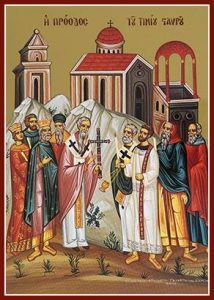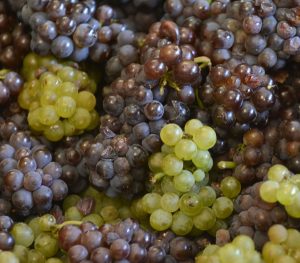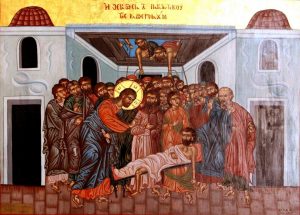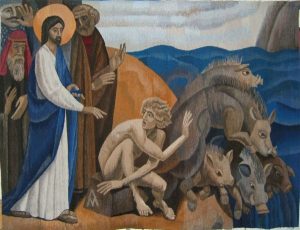 At the end of the reading of St. Paul’s letter to the Corinthians today, St. Paul says, “The message of the cross is foolishness to those who are perishing, but to us who are being saved it is the power of God.”
At the end of the reading of St. Paul’s letter to the Corinthians today, St. Paul says, “The message of the cross is foolishness to those who are perishing, but to us who are being saved it is the power of God.”
On this coming Tuesday, we celebrate the feast of the Procession of the Holy Cross (August 1). The Synaxarion says, “On this day, it was customary in Constantinople to take the relic of the Precious Cross from the imperial palace and carry it to Haghia Sophia, escorted by a crowd of priests and deacons who censed it along the way.” I suspect that this day was the beginning of a period of preparation for the Feast of the Exaltation of the Holy Cross, to be celebrated in approximately seven weeks. We are asked to look toward the Holy Cross as the center of our Christian life.
In the section of 1 Corinthians immediately the Sunday reading, St. Paul says, “For Jews demand signs and Greeks look for wisdom, but we proclaim Christ crucified, a stumbling block to Jews and foolishness to Gentiles, but to those who are called, Jews and Greeks alike, Christ the power of God and the wisdom of God. For the foolishness of God is wiser than human wisdom, and the weakness of God is stronger than human strength.” The Christian faith is a paradox that finds strength in weakness, life in death and wisdom in foolishness. No wonder St. Paul observes today, “For Christ did not send me to baptize but to preach the gospel, and not with the wisdom of human eloquence, so that the cross of Christ might not be emptied of its meaning.” But what does the cross mean for our faith? Obviously, almost none of us will have to die as Christ did, nailed to a cross, though it is possible that some of us will have to surrender our lives for faith in Jesus.
The gospel helps us to understand this. To carry the cross, we must put Jesus first in everything, as our Lord and Savior. It is he who feeds us with the bread of life in the desert of our lives. The multiplication of the loaves is a sign of the eucharist, of Christ giving himself to us, so that we might live in him and him alone. To accept the cross does not mean gratuitous suffering, but the will to live in Christ above all, to be so confirmed in faith that we would lay down our lives for him. The power of the cross, therefore, is not in human eloquence but in the reality of a soul alive in Christ, as St. Paul again proclaimed, “For through the law I died to the law, that I might live for God. I have been crucified with Christ; yet I live, no longer I, but Christ lives in me; insofar as I now live in the flesh, I live by faith in the Son of God who has loved me and given himself up for me. (Galatians 2:19-20)” It means, as in today Gospel, imitating the Lord, who “saw the vast crowd, [and] his heart was moved with pity for them, and he cured their sick.”
 Neither the tomb, nor death, could hold the Theotokos, who is constant in prayer and our firm hope in her intercessions. For being the Mother of Life, she was translated to life, by the One who dwelt in her virginal womb (Kontakion for the Dormition).
Neither the tomb, nor death, could hold the Theotokos, who is constant in prayer and our firm hope in her intercessions. For being the Mother of Life, she was translated to life, by the One who dwelt in her virginal womb (Kontakion for the Dormition). At both of the Divine Liturgies (9 and 10:30am) Father Iura will bless grapes and other fruit on Transfiguration Sunday, August 6.
At both of the Divine Liturgies (9 and 10:30am) Father Iura will bless grapes and other fruit on Transfiguration Sunday, August 6. At the end of the reading of St. Paul’s letter to the Corinthians today, St. Paul says, “The message of the cross is foolishness to those who are perishing, but to us who are being saved it is the power of God.”
At the end of the reading of St. Paul’s letter to the Corinthians today, St. Paul says, “The message of the cross is foolishness to those who are perishing, but to us who are being saved it is the power of God.” In this Gospel, Jesus forgives the sins of the paralytic man before healing him. It is a manifestation of God’s infinite mercy, but there is today and probably always has been, a rigorism which is uncomfortable of forgiveness without conditions.” It is, of course, quite reasonable to expect that one condition for forgiveness would be repentance and, really, that must be assumed. After all, Jesus’ preaching of the Gospel begins, “Repent (metavoite, “change your minds”), for the kingdom of heaven is at hand. (Matthew 4:17)” (Read on the Sunday after Theophany) We are always free to reject God’s forgiveness. However, it is strange that in the gospel stories of forgiveness, “repentance” is downplayed. When our Lord forgives the woman caught in adultery, he does not ask, “Do you repent for your sin?” but instead interrogates her accusers. Only after they are gone and the woman is spared, does he say, “Go, and sin no more.”
In this Gospel, Jesus forgives the sins of the paralytic man before healing him. It is a manifestation of God’s infinite mercy, but there is today and probably always has been, a rigorism which is uncomfortable of forgiveness without conditions.” It is, of course, quite reasonable to expect that one condition for forgiveness would be repentance and, really, that must be assumed. After all, Jesus’ preaching of the Gospel begins, “Repent (metavoite, “change your minds”), for the kingdom of heaven is at hand. (Matthew 4:17)” (Read on the Sunday after Theophany) We are always free to reject God’s forgiveness. However, it is strange that in the gospel stories of forgiveness, “repentance” is downplayed. When our Lord forgives the woman caught in adultery, he does not ask, “Do you repent for your sin?” but instead interrogates her accusers. Only after they are gone and the woman is spared, does he say, “Go, and sin no more.” Fifth Sunday after Pentecost
Fifth Sunday after Pentecost